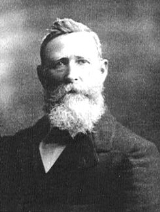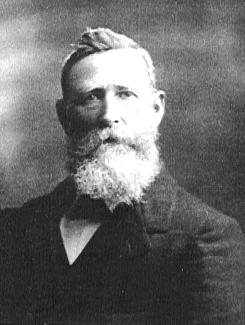
James Dudley Fooshe
Encyclopedia

James Dudley Fooshe, known as J. D. Fooshe, (March 29, 1844 - November 11, 1940) was a soldier, author, farmer, philosopher, Methodist churchman and one of the last surviving Confederate
Confederate States of America
The Confederate States of America was a government set up from 1861 to 1865 by 11 Southern slave states of the United States of America that had declared their secession from the U.S...
veterans in Richmond Co., Georgia. He was a prolific writer of articles that dealt with reminiscences of the American Civil War
American Civil War
The American Civil War was a civil war fought in the United States of America. In response to the election of Abraham Lincoln as President of the United States, 11 southern slave states declared their secession from the United States and formed the Confederate States of America ; the other 25...
and his philosophy of religion, social conduct and political economy.
Early life
He was born March 29, 1844, in Abbeville District (now Greenwood County, South Carolina). He grew up near the Coronaca community, where MethodismMethodism
Methodism is a movement of Protestant Christianity represented by a number of denominations and organizations, claiming a total of approximately seventy million adherents worldwide. The movement traces its roots to John Wesley's evangelistic revival movement within Anglicanism. His younger brother...
made rapid strides during the 19th century. His parents were John Wright Fooshe (December 26, 1815 - December 25, 1888) and Martha Richardson (March 4, 1820 - May 26, 1883), descendants of up-country South Carolinians. He married, December 31, 1866, Mary Ann “Mollie” Fuller (December 17, 1848 - March 20, 1918) daughter of Jones Fuller (December 17, 1848 - October 6, 1868) and Narcissa Harris (November 11, 1807 - September 19, 1860) who bore him twelve children.
Noted Confederate Veteran
He joined Company A, James Battalion of South Carolina in the army of the Confederate States of AmericaConfederate States of America
The Confederate States of America was a government set up from 1861 to 1865 by 11 Southern slave states of the United States of America that had declared their secession from the U.S...
and served throughout the Civil War; being wounded during the first Maryland
Maryland
Maryland is a U.S. state located in the Mid Atlantic region of the United States, bordering Virginia, West Virginia, and the District of Columbia to its south and west; Pennsylvania to its north; and Delaware to its east...
invasion and taken prisoner by the Union army
Union Army
The Union Army was the land force that fought for the Union during the American Civil War. It was also known as the Federal Army, the U.S. Army, the Northern Army and the National Army...
. Shortly paroled, he was furloughed to recover from his wounds and returned to service only to be wounded again at the Battle of the Wilderness
Battle of the Wilderness
The Battle of the Wilderness, fought May 5–7, 1864, was the first battle of Lt. Gen. Ulysses S. Grant's 1864 Virginia Overland Campaign against Gen. Robert E. Lee and the Confederate Army of Northern Virginia. Both armies suffered heavy casualties, a harbinger of a bloody war of attrition by...
. He again recovered and returned to service, this time, in the Quartermaster Corps as secretary
Secretary
A secretary, or administrative assistant, is a person whose work consists of supporting management, including executives, using a variety of project management, communication & organizational skills. These functions may be entirely carried out to assist one other employee or may be for the benefit...
to Dr. Simon Baruch, father of Bernard Baruch
Bernard Baruch
Bernard Mannes Baruch was an American financier, stock-market speculator, statesman, and political consultant. After his success in business, he devoted his time toward advising U.S. Presidents Woodrow Wilson and Franklin D. Roosevelt on economic matters and became a philanthropist.-Early life...
, the noted presidential advisor.
Progressive Citizen
He was born into the Methodist Church, saw it divided into North and South, and heartily approved the merger that made Methodists one church again. On the argument for reuniting the church, he stated: "I fought for the ConfederacyConfederate States of America
The Confederate States of America was a government set up from 1861 to 1865 by 11 Southern slave states of the United States of America that had declared their secession from the U.S...
and lived to see it become greater under the flag of the United States. I want to see our churches exercise the same forbearance that we who once fought with bullets instead of doctrines, have exercised."
He was a champion of a reunified nation and the up building of a better United States
United States
The United States of America is a federal constitutional republic comprising fifty states and a federal district...
. His words shadowed the differences of a divided nation and called for the advancement of one nation standing together in all things.
Life in Georgia
Taking up residence in Richmond County, GeorgiaRichmond County, Georgia
Richmond County is a county located in the U.S. state of Georgia. It is one of the original counties of Georgia, created February 5, 1777. As of 2010, the population was 200,549. The 2007 Census Estimate showed a population of 199,486....
at the age of 60, he took a sand hills plantation
Plantation
A plantation is a long artificially established forest, farm or estate, where crops are grown for sale, often in distant markets rather than for local on-site consumption...
and turned it into one of the garden spots of the county. He became a noted authority on bee culture and promoter of diversification in agriculture
Agriculture
Agriculture is the cultivation of animals, plants, fungi and other life forms for food, fiber, and other products used to sustain life. Agriculture was the key implement in the rise of sedentary human civilization, whereby farming of domesticated species created food surpluses that nurtured the...
. At age 70 he planted a peach orchard and lived long enough to replant it twice.
He was in the limelight of the fight for prohibition
Prohibition
Prohibition of alcohol, often referred to simply as prohibition, is the practice of prohibiting the manufacture, transportation, import, export, sale, and consumption of alcohol and alcoholic beverages. The term can also apply to the periods in the histories of the countries during which the...
and public education
Public education
State schools, also known in the United States and Canada as public schools,In much of the Commonwealth, including Australia, New Zealand, South Africa, and the United Kingdom, the terms 'public education', 'public school' and 'independent school' are used for private schools, that is, schools...
. He believed in good roads, education for all who would take it, and the homely virtues of thrift which the hard days after the Civil War had impressed upon him. He practically abandoned the growing of cotton
Cotton
Cotton is a soft, fluffy staple fiber that grows in a boll, or protective capsule, around the seeds of cotton plants of the genus Gossypium. The fiber is almost pure cellulose. The botanical purpose of cotton fiber is to aid in seed dispersal....
while cotton was still “King” and became an enthusiastic champion of terracing, heavy fertilizing and grafting fruit trees for which he became noted for the high grade of his farm products, especially peaches.
He was critical of newfangled ways of approaching social and economic problems, but never critical of material progress. The slaughter in 1934 of millions of pigs to relieve overproduction was labeled by him "a crime in the sight of God." A similar outburst of wrath greeted the plowing up of cotton, while many of the measures of relief were seen by him as a "sure way to make a nation of loafers instead of workers." At age 90, he tired of his hand writing and learned to use a typewriter
Typewriter
A typewriter is a mechanical or electromechanical device with keys that, when pressed, cause characters to be printed on a medium, usually paper. Typically one character is printed per keypress, and the machine prints the characters by making ink impressions of type elements similar to the pieces...
. To those who smiled at the idea, he retorted: "When a man quits doing something new, he is already dead."
The same philosophy
Philosophy
Philosophy is the study of general and fundamental problems, such as those connected with existence, knowledge, values, reason, mind, and language. Philosophy is distinguished from other ways of addressing such problems by its critical, generally systematic approach and its reliance on rational...
led him to replant his peach orchards for a third time at age 93. He had just begun to gather fruit from the last orchard when he died at Gracewood just outside of Augusta, GA at age 95. He was buried at Magnolia Cemetery in Augusta.
Quotation: "When a fellow gets as old as I am, he appreciates more than anything else the solitude of home and the quiet friendship of those he sees often."
Memoirs of J. D. Fooshe appeared as a series of articles in The Augusta Herald* in the Spring of 1936:
- Confederate Army Camp Life In Early War Days Is Related
- Reminiscences of the 'Sixties
- Wounded, Captured, Mr. Fooshe Sends Letter Home by a Spy
- Exchanged, Mr. Fooshe Given Furlough and Allowed to Come Home Until Wound Was Better
- Becomes Member of Courier Staff of Chief Supply Man for General Lee's Forces
- Carpet-Baggers Flock to South
- J.D. Fooshe Tells of His Early Life on Farm After Civil War
- Three Lifetime Lessons Early in Married Life
- Compares Present Conditions With Those of Many Years Ago
- J.D. Fooshe Adds Raising of Bees as Sideline to Farming
- Bee Industry One of Finest Nature Studies, Says Fooshe
- See "Soldier, Planter, Philosopher: The Life of J. D. Fooshe," by Samuel Taylor Geer, 1999, located at the Georgia Department of Archives and History, Augusta Genealogical Society (Augusta, GA) and the Dallas Public LibraryDallas Public LibraryThe Dallas Public Library system serves as the municipal library system of the city of Dallas, Texas .-History:In 1899, the idea to create a free public library in Dallas was conceived by the Dallas Federation of Women's Clubs, led by president Mrs. Henry Exall. She helped raise US$11,000 from...
(Dallas, TX).

